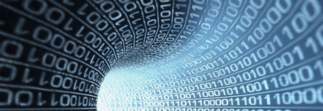
Photo: Bryce Vickmark
Q: How would you describe your role?
A: In data management we partner with researchers across the research life cycle to increase the impact of that research through appropriate data management practices. My role is to coordinate and communicate this work and think about where it is going next. With ever expanding technological changes, it’s always a new frontier. What are our responsibilities, what are the responsibilities of researchers, and what resources are available to best partner to achieve the Institute’s goals?
Q: What’s the biggest challenge you face in data management?
A: It’s such a large area of endeavor; there is so much data being produced in the pursuit of human knowledge and accomplishment, and some part of it has to be maintained. Plus, research itself is always changing. There are always new tools and methods, but some of the basic needs remain constant—the challenge is how we address everything. We need to think about what we ultimately want to accomplish and how we serve the goals of the Institute, and to work backwards.
Q: What are some of the other issues you think about as the leader of this program?
A: Technology and our understanding of scholarly communications are constantly evolving. There used to be this idea of the researcher as a solitary hero. How do we combine that with the collaboration, inclusiveness, interdisciplinarity, and interconnectedness that research now requires? Data needs to be collected, documented, described, and made accessible in ways that extend its use beyond the original research focus, so it can be employed in ways even the researcher didn’t envision. I also think about the voices in research that haven’t been heard because of issues of equity. We need to make data accessible in ways that expand global research participation: who can use it, what can it be used for, and how global contributors are being recognized.

